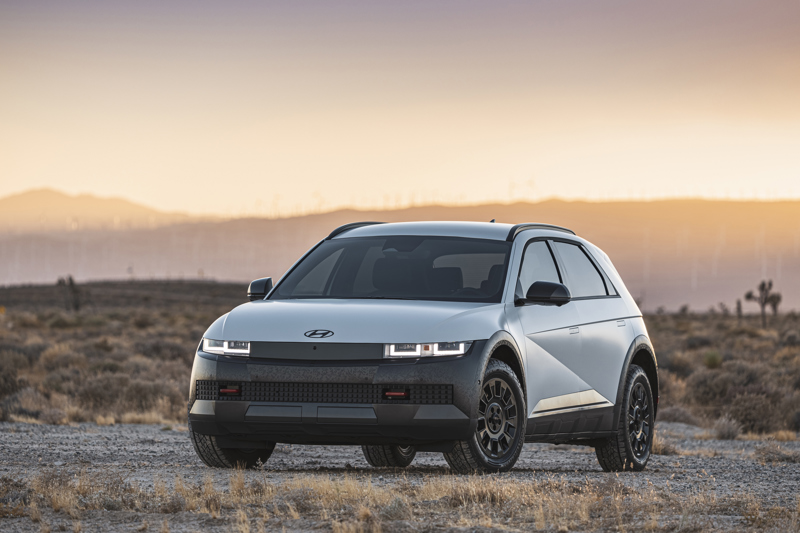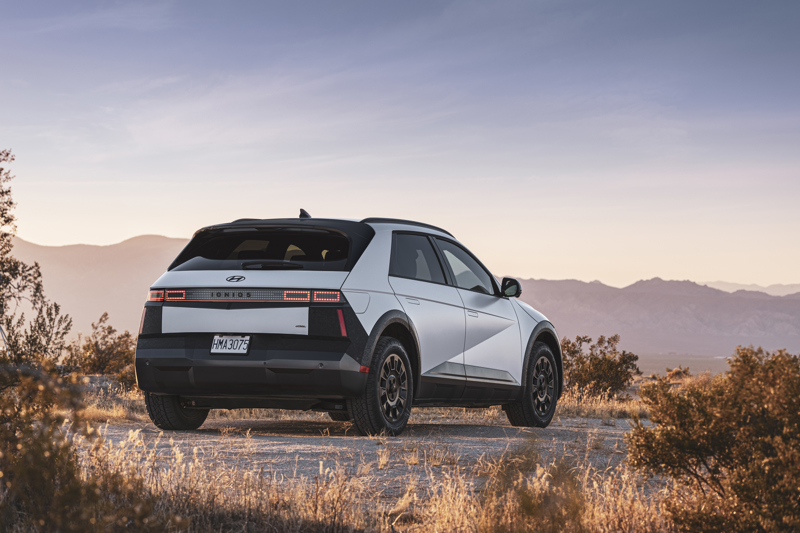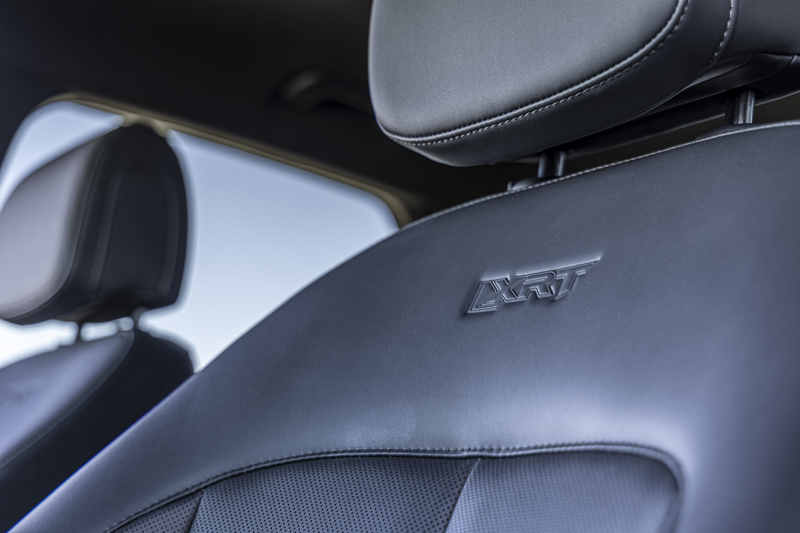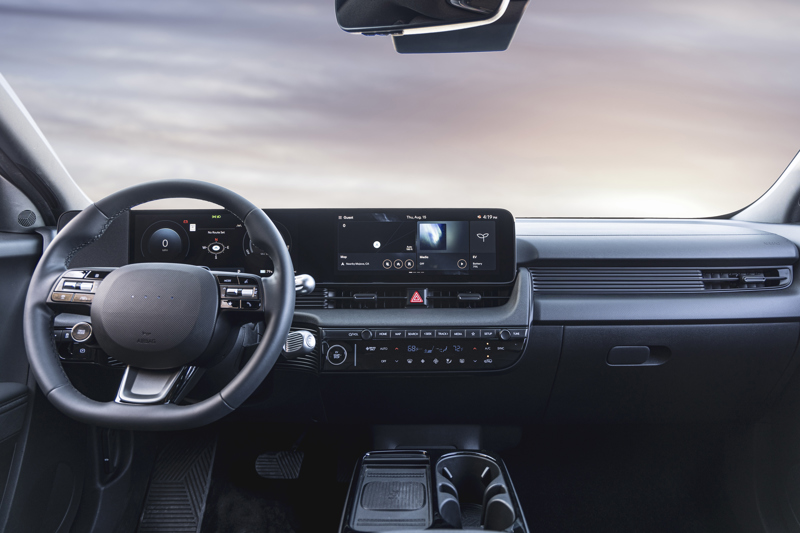Hyundai Ioniq 5 XRT
Hyundai Ioniq 5 XRT is an all-electric SUV offering a EPA range of up to 402 km (250 miles). EVKX.net has all the details you need.
Hyundai Ioniq 5 XRT
We've organized this article into specific sections for easier navigation. Click the links below to jump to different areas or read on for the full article. Additionally, we offer an overview of the full specifications, an image gallery, detailed information about charging performance, and some online reviews. Our sections include:
- Performance
- Battery, Range, and Charging
- Drivetrain (suspension, brakes, and steering)
- Exterior (paint colors, wheels, and more)
- Interior (seating and features)
- User interface and controls
- Infotainment system
- Lighting Systems
- Advanced Driver Assistance Systems (ADAS)
- Cargo Space and Towing
Performance
The Hyundai Ioniq 5 XRT delivers a solid performance with a maximum power of 239 kW (325 hp / 321 bhp) and a total torque of 605 Nm (446 lb-ft). It accelerates from 0 to 100 km/h (0 to 62 mph) in 5.1 seconds and reaches a top speed of 185 km/h (115 mph), making it competitive within its class.
Battery, Range, and Charging
The high-capacity battery has a gross capacity of 84.0 kWh and a net usable capacity of 80.0 kWh, providing a 4.0 kWh buffer (4.8%) for battery protection. Operating at a nominal voltage of 697 volts, it qualifies as an 800-volt battery system. This high voltage is pivotal in enabling the system's charging capabilities.
The vehicle supports fast DC charging with a maximum power of 233 kW. Charging from 0% to 100% takes approximately 42 minutes, while a typical 10% to 80% charge takes about 18 minutes with an average charging speed of 188 kW. Considering an additional 5 minutes for each charging stop due to driving interruptions, the optimal charging range is from 1% to 75%. This results in an effective charging speed, including time lost, of 152 kW, with each charging session taking about 23 minutes and 26 seconds. This efficient charging capability makes the Hyundai Ioniq 5 XRT a convenient option for long-distance travel.
In a 1000 km challenge at a constant speed of 120 km/h (75 mph) with an assumed consumption rate of 24 kWh/100 km, the trip would take about 9 hours and 24 minutes, needing three charging stops from 1% to 68%, totaling 64 minutes of charging time.
Onboard Charger
The standard onboard charger supports up to 11 kW for Level 1 and Level 2 AC charging, allowing a full 0–100% charge in about 7 hours and 16 minutes with a standard home setup.
Charge Port
The location of the charge port is on the right rear side. This placement makes it easy to use charging stations that require backing up to connect.
The connector types vary between different markets. This model uses NACS for North America and CCS Combo 2 for Europe. For complete specifications for all markets, refer to the full specifications.
Drivetrain
The Hyundai Ioniq 5 XRT features an all-wheel drive system powered by two motors, one on each axle.
Suspension
The suspension has a fixed height and damping characteristics.
Ground clearance with this setup is 178 mm.
Brakes
Regenerative Braking
Regenerative braking is available in two modes. You can use one-pedal driving or you can coast and use the blended brakes to regen.
The maximum regenerative power is 150 kW.
Exterior
The Hyundai Ioniq 5 XRT, with dimensions of 4635 mm in length, 1890 mm in width, and 1605 mm in height, falls into the Compact SUVs category, also known as C-SUVs. These offer a balance between the practicality and maneuverability of smaller vehicles and the space and versatility of larger SUVs.
The Hyundai Ioniq 5 XRT is available in a total of 6 paint colors, including several striking metallic options.
You can select from multiple wheel designs, all available in the same size, on the Hyundai Ioniq 5 XRT, allowing you to personalize your vehicle to match your style and driving preferences. The available tire and wheel combinations include:
- 235/60 tires on 18" rims
The car has four regular doors and a hatchback-style liftgate.
There are two different roof options to select from.
The standard is just a regular roof.
As an option, you can order this model with a large panoramic roof extending over most of the areas from the front to the rear. This glass makes the car’s interior feel more spacious and bright, which can improve the mood and comfort of the occupant. It has an electric curtain that occupants can use to protect against the sun.
Additionally, you can order the car with tinted windows from the B-pillar backward, which enhances privacy and reduces glare and heat from the sun, making the interior more comfortable for passengers.
Hyundai Ioniq 5 XRT
Interior
There is one seat type you can select in different materials.
Seats
The Hyundai Ioniq 5 XRT accommodates five passengers with two front seats and a three-seat bench in the rear.
First Row Seats
The Hyundai Ioniq 5 XRT offers a single type of front seat.
The following functionalities are available on the **** seat:
- Fore-and-aft adjustment (electrically adjustable)
- Recline adjustment (electrically adjustable)
- Height adjustable headrest
- Heating
- Memory (standard for driver, not available for passenger)
- Adjustable lumbar support (electrically adjustable as an option)
- Ventilation (optional)
Hyundai Ioniq 5 XRT
Second Row Seat
The second row features a standard three-seat bench with a 60:40 split, allowing each section to fold separately to increase cargo space.
Additional functionalities include:
- Recline adjustment (manually adjustable)
- Heating (standard for outer seats)
Climate System
There is one climate system available:
- 2-zone climate system: Supports different temperatures for the driver and passenger.
This model has a heat pump as an option. This heat pump can save significant energy used for heating in cold weather.
Comfort Features
The Hyundai Ioniq 5 XRT includes several features to enhance comfort and convenience:
- Wireless Phone Charging
User Interface and Control
This model features a dual-screen setup integrated into a shared horizontal frame on the dashboard, clearly separating driver and infotainment functions while maintaining a unified visual design.
Key screen details:
- Driver Information Display: A 12.3-inch screen positioned behind the steering wheel on the left side of the shared dashboard frame. It provides essential driving data such as speed, range, and navigation prompts.
- Infotainment Screen: A 12.3-inch touchscreen located on the right side of the same shared frame. It serves as the main interface for infotainment, navigation, and vehicle settings.
A optional head-up display projects key driving information—such as speed and navigation cues—onto the windshield for enhanced safety and convenience.
Hyundai Ioniq 5 XRT
Steering Wheel
The Hyundai Ioniq 5 XRT is equipped with a single type of steering wheel:
- Circular Steering Wheel: This steering wheel features optional integrated heating for added comfort during cold weather. It also provides intuitive control over the infotainment system, allowing you to easily adjust the volume, change music tracks, and manage other key functions.
Mirrors
Both the exterior and interior mirrors use conventional mirror technology to provide a clear view of the area behind the vehicle.
Infotainment
Navigation System
With the common.standardfeature in-car navigation system, you have all the assistance you need to reach your destination effortlessly.
Phone Mirroring
The Hyundai Ioniq 5 XRT supports Android Auto and Apple CarPlay, allowing you to mirror your phone's screen on the car's display. This functionality enables you to run apps like Google Maps or Waze directly from your phone.
Sound System
The Hyundai Ioniq 5 XRT comes equipped with one sound system option:
- Bose Premium Sound System: Features eight speakers.
Additionally, the model includes 4 USB-C connections as standard.The model has 1 USB-A connections as standard.
Mobile App
The Hyundai Ioniq 5 XRT comes with a dedicated mobile app, available for both Android and iOS devices, allowing you to manage and monitor your vehicle remotely. The app offers a wide range of features designed to enhance your driving experience:
Lights
Standard Headlights: These use advanced LED technology, providing bright and efficient illumination.
The taillights use LED technology, ensuring both high visibility and energy efficiency.
Advanced Driver Assistance Systems
The Hyundai Ioniq 5 XRT features a range of standard and optional advanced driver assistance systems (ADAS) designed to enhance safety and comfort.
Safety Systems
Anti-lock Braking System (ABS): Standard on the Hyundai Ioniq 5 XRT, this system prevents the wheels from locking during braking.
Electronic Stability Control (ESC): Standard on the Hyundai Ioniq 5 XRT, this system improves the vehicle's stability and handling during sudden maneuvers or on slippery road conditions.
Lane-Keeping Assist (LKA): Standard on the Hyundai Ioniq 5 XRT, this system helps prevent the vehicle from drifting out of its lane.
It also includes a Lane Departure Warning system to alert the driver if the vehicle veers out of the lane.
Front Cross Traffic Assist (FCTA) : Standard on the Hyundai Ioniq 5 XRT, this driver assist system that helps drivers detect oncoming traffic when crossing an intersection or turning left or right from a stopped position.
Rear Cross Traffic Alert (RCTA): Standard on the Hyundai Ioniq 5 XRT, this system uses sensors to detect approaching vehicles from the side when backing out of a parking space or driveway.
Automatic Emergency Braking (AEB): Standard on the Hyundai Ioniq 5 XRT, this system autonomously applies the brakes to prevent or reduce the severity of a collision if the driver does not react in time.
Automatic Emergency Steering (AES): Standard on the Hyundai Ioniq 5 XRT, this system assists in avoiding collisions by automatically steering the vehicle in an emergency.
Blind-spot Monitoring (BSM) : Standard on the Hyundai Ioniq 5 XRT, this side assist system helps to detect traffic in blind spots.
Driving Automation
With the standard level 2 system, you get the following driving automation features.
- Adaptive Cruise Control (ACC)
- Lane Centering Assist (LCA) /AutoSteer: keeps the car in your lane and slows down if needed in traffic. The system limits how long you can drive without touching the steering wheel.
- Automatic Lane Change (ALC)
Safety
Security and Access Technologies
The Hyundai Ioniq 5 XRT is equipped with essential security features to protect you and your vehicle, offering simplicity and reliability. These include:
Cargo Capacity and Towing Ability
The trunk offers a cargo capacity of 527 liters (18.6 CU FT). With the rear seat folded down, this expands to 1578 liters (55.7 CU FT).
On the roof, you can load up to 80 kg (176.4 lbs).
Roof rails are standard for easy mounting of a roof box or rack.
Additionally, there is a frunk (front trunk) with a storage capacity of 24 liters (0.8 CU FT).
The vehicle’s maximum weight is 2560 kg (5644 lbs), with a base weight of 2045 kg (4508 lbs). This allows for a maximum load of 515 kg (1135 lbs), including the driver and passengers. Note that some options may increase the base weight and reduce the maximum loading capacity.
A towbar can be added to the vehicle. The maximum permissible weight for a braked trailer is 1600 kg (3527 lbs), while for an unbraked trailer, it is 750 kg (1653 lbs).
Alternative Models
In the rapidly expanding EV market, EVKX.net has identified several alternatives to the Hyundai Ioniq 5 XRT that are worth considering based on features, specifications, and pricing.
Most sold EVs in Norway
The following list shows the most sold EVs in Norway in January 2024.
- Toyota Bz4x
- Volkswagen ID.4
- Nissan Ariya
- Tesla Model Y
- Tesla Model 3
- Volvo EX30
- Skoda Enyaq
- Volkswagen ID.3
- Audi Q4 e-tron
- Hyundai Kona




